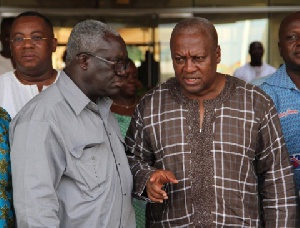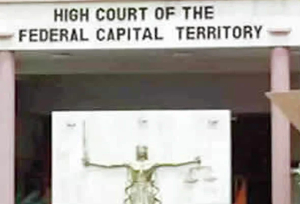The John Dramani Mahama-led National Democratic Congress (NDC) has been put in a particularly dire situation with the release of a report on Ghana’s further decline in credit worthiness by Fitch, an international rating agency.
Ghana’s credit worthiness has been affected since February 2013, when Fitch dropped Ghana’s profile from ‘Stable’ to ‘Negative’. The latest drop from B+ to B makes Ghana’s credibility on the international debt market a little worse than negative.
With a debt profile of almost GH¢50billion, the Mahama administration’s appetite for barrowing may reach the end of the road as the country gradually inches towards Highly Indebted Poor Country (HIPC) tag with Ghana’s debt profile nearing 50per cent of GDP mark.
This means that even though President Mahama, at the Fourth Policy Fair in Accra on Wednesday, stated unequivocally that “…there is a strong need to borrow to satisfy the high demand for infrastructure development,” the ratings would make it difficult for the government to source loans abroad, especially concessionary ones.
According to financial analysts, even if the country succeeds in sourcing these loans, the interest on them would be unbearable, because of the perceived risk associated with lending money to Ghana.
At the policy fair, President Mahama conceded to this difficulty by stating; “….I want to assure the country that we would do our best to keep our debt profile within reasonable limits.”
But it is unclear how his government would reconcile the high interest it will begin to pay on loans and the need to borrow more to boost infrastructural development.
Grabbing Cash
Currently, every cedi available locally has been scooped by the Mahama administration either to pay loans or salaries, leaving virtually nothing for development.
Statutory payments to the District Assembly Common Fund; Ghana Education Trust Fund (GETFund); National Health Insurance Levy, Road Fund for the payment of contractors and Communication Tax, otherwise known as Talk Tax for the payment of Youth Employment, among others, are in arrears, depriving the affected agencies of resources to operate.
Pension Cash Missing
The worst of all, even pension funds have been spent by the administration, making it difficult for pensioners to be paid on time.
The money for second-tier pension operators under the new Pension Scheme deposited at the Bank of Ghana is no longer there with report that the government had borrowed it with rather lower interest.
Recently, government workers and bodies that had registered with fund managers under the new Pension Law could not have their contributions credited to their second tier operators because of the inability of BoG to credit them with the cash.
Yesterday, DAILY GUIDE’s office was inundated with calls from pensioners lamenting that their pension had not been paid as at yesterday. It is supposed to be paid on the fourteenth day of every month.
Enquiries made by DAILY GUIDE indicated that cheques had been issued by the Social Security and National Insurance Trust (SSNIT) for the accounts of pensioners to be credited but the Bank of Ghana said there was no money.
BoG Bounce Cheques
According to reports, evidence of the country’s insolvency is epitomised by the unprecedented rejection of BoG cheques.
The bouncing of BoG cheques has become regular rather than an exception.
With rating of Fitch downgrading Ghana to a lower level, it is only a matter of time before the country is declared bankrupt.
Usually, such negative testimonial from rating organisations makes international borrowers skeptical about the ability of countries to pay back the monies they borrow.
The situation has dealt a significant blow to the Mahama-led government’s estimation that Ghana has the capacity to borrow more to develop infrastructure to alleviate poverty in the country.
In a statement released by Fitch on Thursday, the international rating organisation gave reasons for taking off a notch of credibility from Ghana. “The authorities continued to overrun on wages, interest costs and arrears… Policy credibility has been significantly weakened, following two years of larger-than-expected budget deficits,” the agency said in its statement.
Fitch slammed Ghana for its insatiable urge to overshoot budget, thereby further worsening its indebtedness.
In a gloomy release by the Bank of Ghana’s Monetary Policy Committee (MPC) on the latest financial health of the country, the apex bank stated that for every productive cedi the country’s population produced, almost half of the amount constituted debt.
At the end of August 2013, Ghana’s public debt stock had gone through the roof and was standing at GH¢49.9 billion or approximately 49.5 per cent of GDP. The total value of production is estimated at about GH¢99 billion.
Meanwhile, Ghana’s budget deficit has also shot through the roof; it jumped to 11.8 per cent of GDP from 4 per cent in 2011, largely due to a high government wage bill and election spending.
Desperation
Critics are certain that this desperation to cut down on its borrowing and generate more productive revenue is responsible for the recent hikes in sources of government revenues, including taxes, petroleum products and utility prices.
According to the TUC in a statement released on Wednesday and signed by its Secretary General, Kofi Asamoah, the price hikes and the failure of government to settle wages of public workers, had caused severe hardship to these workers and their families.
The government recently hiked utility prices as high as 79 per cent. This has drawn outrage from the citizenry and has forced organised labour under the umbrella of the Trades Union Congress (TUC) to threaten a nationwide industrial strike.
The TUC has given the NDC government a 10-day ultimatum that would elapse next Tuesday. The ultimatum has given the Mahama-led government sleepless nights as the President, last week, subtly pleaded with the TUC to reconsider their stance.
Labour Rejects Pleas
But the TUC has rejected attempts by the President to talk it out of its ultimatum.
According to the organisation, it had also been angered by the impression being created by Government machinery that a technical committee was already working on the utility tariff increases while in actual fact that was not the case.
A statement issued on Wednesday in Accra and signed by Kofi Asamoah, TUC Secretary General, noted that the letter purporting to formally constitute and announce the membership of a working committee to reconsider the tariff increases was only received on Wednesday, October 16, 2013, a few days to the expiration of the ultimatum.
The labour union has, therefore, vowed to instigate a nationwide industrial action, if government failed to slash last month’s 78.9 per cent hike for electricity and 52 per cent for water by the Public Utilities Regulatory Commission (PURC).
At a meeting on Wednesday at the Teachers’ Hall in Accra, the TUC, among other things, appraised developments on its engagement on the killer tariffs, the payment of the 2013 public sector pay arrears and the nomination of the chairperson of the National Labour Commission.
The meeting also discussed President Mahama’s appeal for withdrawal of the 10 working days ultimatum and an invitation to Organised Labour to serve on a technical working group on utility tariffs.
“While Organised Labour agreed in principle to participate in the technical working group on utility tariffs, it calls on Government to prevail on the PURC to suspend the implementation of the announced tariff increases in order to create a level playing ground for effective dialogue on the way forward,” it emphasised, adding that the 10-working-day ultimatum it issued still remained.
General News of Friday, 18 October 2013
Source: Daily Guide













